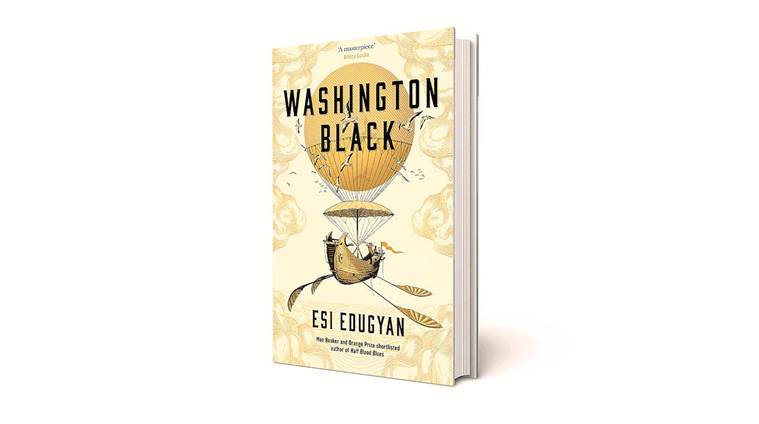Written by Pooja Pillai |Updated: November 24, 2018 1:11:48 am
To Build a Dream
Scenes of startling beauty and pathos punctuate this story shortlisted for the Man Booker Prize.

Title: Washington Black
Author: Esi Edugyan
Publisher: Hachette
Pages: 432
Price: 699
Author: Esi Edugyan
Publisher: Hachette
Pages: 432
Price: 699
Midway through Esi Edugyan’s Washington Black, the title character catches a glimpse of a sight that he unhesitatingly calls “miraculous”. It occurs while he is engaged in the kind of odd job that he has been living off for a while — unloading crates from a sailing vessel in the dead of night. And then it happens. “I caught sight of a sudden current, a sudden flash. Then from farther off came another flash, and then another, tight explosions of green and yellow, as if comets were being detonated there.”
These are bioluminescent jellyfish, neither the first nor the last wonders of nature that Wash, as he’s called, sees in his lifetime. But they jolt him free of the depression that has claimed him for its own. “The black of the sea was far-reaching, as though no light could penetrate it,” he recounts, “And yet here these creatures floated, fragile as a woman’s stocking, their bodies all afire. My breath left me. I leaned over the edge of the little rowboat and watched the sea pulse in a furnace of colour.”
This, then, is how Washington Black unspools — scenes of startling beauty and pathos punctuating a tightly-told story, that clips along at a rare pace as the protagonist makes his way around the world, from British West India to Virginia, Nova Scotia, London and Morocco.
We begin at Faith, a sugar plantation in Barbados that is run on slave labour and which is the brutal world of Wash’s earliest memories. The boy is an orphan, at the mercy of his master, the overseers and older, stronger slaves, until he is offered protection by another slave, a fierce woman called Big Kit who, rumour has it, was a Saltwater, or witch, in Dahomey before she was abducted and sold. Life on the plantation changes, particularly for Wash, when the old master dies and in his place arrives Erasmus Wilde, accompanied by his brother Christopher ‘Titch’ Wilde. The latter, unlike his older brother, is an abolitionist.
He is also, like his absent father, a scientist, obsessed with making a success of his “cloud-cutter” — an aerial machine of his own design — and little Wash just happens to be the right weight for ballast. Titch persuades his brother to let Wash be his assistant and soon discovers that the boy has a preternatural gift for drawing, a talent that the gentleman-scientist taps into for his own studies. He is also, however, kind to the boy and encourages him to develop his natural capacities. In him, Wash gains a father figure, even as he loses Big Kit, the closest thing to family that he has known until then.
Soon, however, a horrific incident that threatens to cost Wash his life causes the duo to flee, and, as the cloud-cutter lifts off, so does the story. This is when Edugyan’s larger themes, that had only been hinted at in the opening chapters, find scope to expand and attain full expression. As Wash travels the world, we explore with him the true meaning and implication of what it is to be a brilliant mind striving to survive in a hostile world, and what costs a family — or the lack thereof — can extract from one. Wash is haunted, first by his fear that Titch is only keeping him around until he can abandon him, and later, by actual abandonment, even as Titch himself remains haunted by his complicated relationship with his brilliant, but distant father.
Running through the story, like a dark undercurrent, is an examination of how the world robs the young of innocence and wonder, and how this early betrayal shapes who these children will become. As one character says, “I do not much care for childhood. It is a state of terrible vulnerability, and is therefore unnatural and incompatible with human life. Everyone will cut you, strike you, cheat you, everyone will offer you suffering when goodness should reign.”
Still, there is occasional respite from all this bleakness — the kindness of strangers, the cooling hand of a mother-figure, and the warm touch of a lover. In Edugyan’s complex, richly-woven tale, the soft voice of the narrator — made wise and weary by experience — guides us to the realisation that the human spirit is, after all, resilient. Go back to that scene with the jellyfish, for instance. Its role within the story might be to serve as the moment when young Wash, adrift from his true self for so long, reaches for a lifeline his innate talent for drawing and bringing to vivid life on paper the world that he sees around him. But it also shows us who Washington Black really is — a fragile creature, stubbornly flaring with life and brilliance in a world that threatens to engulf in darkness all but the strongest.






















No hay comentarios:
Publicar un comentario